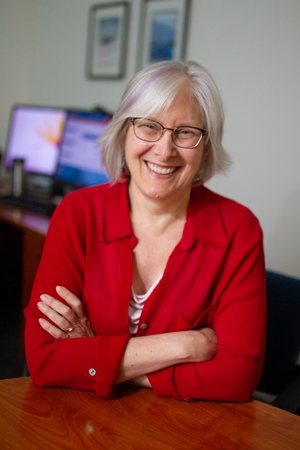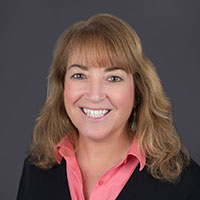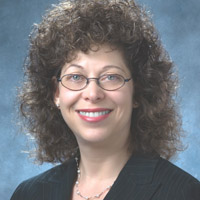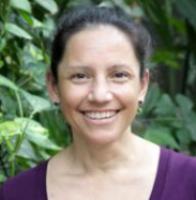Spotlight on leadership: the DrPH
Periodically, we will feature a nationally recognized leadership program or initiative offered at the UNC Gillings School of Global Public Health. The first is the online Doctor of Public Health (DrPH) degree in health leadership, housed in the Gillings School’s Department of Health Policy and Management.
THE GILLINGS SCHOOL’S ONLINE DrPH
Building a committed global network of mid-career public health leaders since 2005
The UNC DrPH program in health leadership was a transformative experience for me; both the coursework and dissertation process were directly relevant to my work. I was able to grow as an individual and as a leader, while also developing a lifelong network of friends and colleagues. It’s been instrumental in advancing my career [and in my] advocacy to improve the health and financial security of everyone served through the health care system.
Elizabeth Cahn Goodman, DrPH (2017), JD, MSW
Executive Vice President, Government Affairs and Innovation
America’s Health Insurance Plans
The executive online Doctor of Public Health (DrPH) program in health leadership exemplifies the Gillings School’s commitment that public health leaders have the skills and knowledge they need to effect change and make a difference. The online program, one of the first established, is designed to ensure that mid-career professionals attain the public health skills and knowledge they need, together with leadership development, all while continuing to maintain their full-time jobs and lives.
The DrPH program, geared to professionals with at least five years’ experience post-master’s degree who hold mid- to senior-level leadership positions, enhances the capacity of health leaders to improve the public’s health at local, state, national and international levels. For more than a decade, the program has helped to build leaders who are uniquely trained to tackle some of the most challenging public health issues here and around the world.
ONE-THIRD TO ONE-HALF OF EVERY DrPH COHORT LIVE AND WORK OUTSIDE THE UNITED STATES.
“The program is unique in terms of the diversity of experiences our students bring to the table,” says Pam Silberman, JD, DrPH, professor of health policy and management and director of the DrPH program. “They’re already leaders in their own right, but they’re striving to enhance their skills to become even more effective. Our students and alumni work in all types of organizations and settings, both domestically and internationally.”
Silberman says that one thing students do have in common is their passion to make a difference—to improve the health of populations. The cohort model allows students to be immersed in the same classes throughout the program, which fosters collaborative and dynamic solutions to public health issues.
“We strive to create an optimal learning environment, in which students learn as much from each other as they do from the faculty,” she said.
Students meet online one night per week, over two years, for classes taught via video-conferencing. The classes are augmented with five of the six onsite sessions on the UNC-Chapel Hill campus. While students are not in the same location for most of the program, they feel a strong sense of community, and that shapes their experiences while in the program.
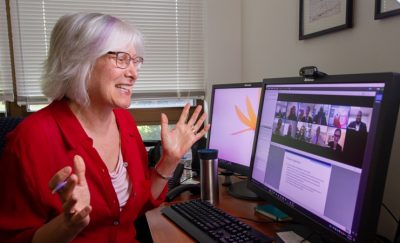
Dr. Pam Silberman conducting a class in the DrPH program. One-third to one-half of every DrPH cohort — composed of a diverse group of students with a wide range of backgrounds — live and work outside the United States.
Because the DrPH program focuses on both local and global systems, one of the six in-person meetings is in a location where students can come to understand the workings of a health care system other than their own – often in London.
“We provide students with a wide array of courses that give them a grounding in the skills they need to be more effective leaders,” says Silberman.
Since the DrPH program is an applied practice degree, the focus of the dissertation is to understand and identify strategies to address a current public health problem and detail those strategies in a “plan for change.”
Silberman says that, while there is a practicum requirement, students are able to quickly translate what they are learning to the field because working full time is a program requirement.
“We consistently hear from students that they apply what they learn in class in their jobs,” she says.
Current student Kristie Mikus, deputy county director at the Centers for Disease Control and Prevention in Zambia, couldn’t agree more.
“I find that I’m in class Tuesday nights, and I’m applying what I learned on Wednesday morning in the office. It’s amazing,” she says. “It’s hard not to teach everyone around you what you’re learning, so my colleagues at the CDC office in Zambia get regular doses of cutting edge research and thinking on age-old issues, as well as modern challenges. Completing this program while working full-time allows me to use real-time, real-life examples and get support and assistance for challenges I’m facing.”
NOW, 13 YEARS LATER, MORE THAN 100 PEOPLE HAVE SUCCESSFULLY DEFENDED THEIR DISSERTATIONS.
Their unique new skills, acquired at the Gillings School, have made them more successful in local, national and global public health positions. (See information on selected alumni below.)
In 1992, in response to a 1988 landmark report by The Institute of Medicine (now the National Academies of Sciences, Engineering and Medicine’s Health and Medicine Division), which noted the need for public health practitioner leadership training, the School offered a one-year residential program.
Recognizing the challenges for working professionals to take leave to attend a residential doctoral program, UNC developed the online two-year executive program in 2005. Since then, it has become one of the most competitive and emulated DrPH programs in the world.
Silberman and her colleagues continually work to improve it. In the last few years, the curriculum has grown to include classes in systems thinking, program planning and implementation science. Plans are underway to add classes on effective education and pedagogy skills.
“As we look to the future, we want to monitor what we’re offering and provide the right skill sets to ensure leaders are as effective as they can be,” says Silberman.
Graduates continue to find benefit, reaping the rewards of being part of such a dynamic and distinguished program.
In a 2015 alumni survey, 96 percent of respondents reported that they would “strongly” or “very strongly” recommend the program. Almost four-fifths (79 percent) reported that the Gillings School’s DrPH program accelerated their careers or promotion paths, and 76 percent reported taking on more leadership roles as a result of their training.
Silberman says that graduates form an enduring learning community that strengthens the field of public health.
“Within each cohort, students develop lifelong friendships,” she says. “Long after the program is over, those ongoing relationships provide a continuous learning environment in which our graduates provide professional and personal support to one another.”
Nancy McGee, DrPH, says her cohort (cohort 4) continues to stay in close contact.
“We support each other [collectively] as we individually lead diverse public health initiatives,” she says — endeavors that are, no doubt, making measurable differences to the field.
NOTABLE ALUMNI OF THE GILLINGS SCHOOL’S DrPH PROGRAM IN HEALTH LEADERSHIP
Nicole Bates, DrPH (2008), is deputy director for global policy and advocacy for the Bill & Melinda Gates Foundation. She introduced the foundation’s first global advocacy strategy for vaccines in 2009. Over time, these strategies grew civil society presence in North America, Europe, Africa and Asia; established cross-sectoral consensus through a global action plan for vaccines; and leveraged the foundation’s investments to secure more than $15 billion to improve child health in the world’s poorest countries. Her portfolio also has covered broad child health issues including pneumonia, diarrheal disease and water/sanitation/hygiene.
Dorothy Cilenti, DrPH (2009), is associate professor of maternal and child health at the Gillings School and director of the National Maternal and Child Health Workforce Development Center at UNC. Created in 2013, the center offers training, collaborative learning, coaching and consultation in implementing health transformation to those in the maternal and child health workforce across the U.S. This investment in the public health workforce produces professionals who are skilled in systems integration, evidence-based decision making, and change management and adaptive leadership.
Lisa Koonin, DrPH (2013), is deputy director of the influenza coordination unit in the National center for Immunization and Respiratory Diseases at the Centers for Disease Control and Prevention (CDC). An expert in national influenza pandemic preparedness, Koonin contributed to the development of the U.S. National Strategy for Pandemic Influenza Implementaiton Plan, CDC’s Community Mitigation guidance, and has served on the White House National Security Staff’s Pandemic Sub-Interagency Policy Council since 2006. She has held leadership positions during multiple CDC emergency responses, including the 2013 H7 N9 avian influenza outbreak in China; the 2014-2015 Ebola response; and the 2016 Zika response.
Jacqueline Au McPherson, DrPH (2015), was appointed regional director of the Asia Pacific Regional Office for FHI360 in 2015. As a senior global health and development expert, she has worked in challenging political and security environments with government agencies, academic and research institutions, international local nongovernmental organizations, bilateral and multilateral donor agencies, and civil society organizations to protect and support health. Currently, the Asia Pacific Regional Office supports programs working in the areas of HIV, tuberculosis, neglected tropical diseases, malaria, avian and pandemic influenza, emerging infectious diseases, medical waste management, and diagnostic and research laboratory work.
More information about the program is available online.
Questions? Contact student services manager Lynnette Jones at Lynnette_jones@unc.edu or (919) 966-7391.
Contact the Gillings School of Global Public Health communications team at sphcomm@listserv.unc.edu.

